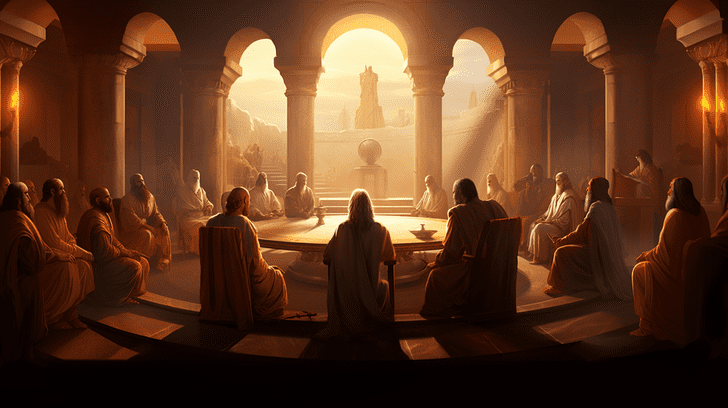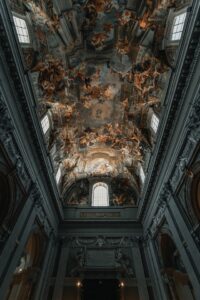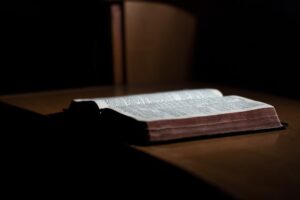Step back in time to the Council of Laodicea, a pivotal gathering that forever changed the course of Christian worship.
Like a tempestuous storm, this council unleashed a whirlwind of transformative decisions that would shape the future of Christianity.
Picture yourself amidst the heated debates and intense discussions as bishops from all corners converge to deliberate on matters of faith and practice.
Within these hallowed walls, a seismic shift occurred – a turning point in history. The original Sabbath, observed by Christ Himself and His followers, was cast aside like an old garment.
In its place emerged a new day of rest: Sunday.
The Council of Laodicea decreed that Christians should abandon their sacred observance of the seventh day and instead embrace Sunday as a day of worship.
This radical departure from the commandment of God to tradition was not without consequences.
Join us on this journey through history as we explore the Council of Laodicea and Sunday worship – an event that forever altered the course of religious devotion for generations to come.
Historical Context of the Council of Laodicea and Sunday Sabbath
The Council of Laodicea, which was held by the Catholic Church, played a significant role in changing and abolishing the original Sabbath. The council passed a decree that prohibited the observance of the “Jewish Sabbath” and instead promoted resting on Sunday, the first day of the week.
Note: Did you know the term “Jewish Sabbath” does not exist in the Bible?
The Bible says the Sabbath was made for mankind, and not only for the Jewish people! (Mark 2:27)
There were no Jewish people when God instituted the Sabbath in the garden of Eden. (Genesis 2:2-3)
This decision marked a shift away from the original practice of observing the seventh-day Sabbath, which had been observed by Christ, the apostles, and early Christians.
It is worth noting that the bishops of Rome displayed even greater hostility towards the Sabbath than their counterparts in other cities.
The Catholic Church exerted extensive influence and wielded bitter hatred towards the Sabbath, contributing to its eventual change and abolition.
Key Decisions Made by the Council
One important decision made during this gathering was to establish a new day of rest for Christians.
The Council of Laodicea, convened in the fourth century by the Catholic Church, passed a decree that Christians should no longer observe the seventh-day Sabbath but instead rest on the first day of the week, Sunday.
This decision marked a significant departure from the practice of early Christians who had followed Christ’s example and observed the Sabbath.
The council’s decree also included a “curse” upon those who would dare to continue observing the Sabbath.
“Christians shall not Judaize and be idle on Saturday but shall work on that day; but the Lord’s day they shall especially honour, and, as being Christians, shall, if possible, do no work on that day. If, however, they are found Judaizing, they shall be shut out from Christ”
(Strand, op. cit., citing Charles J. Hefele, A History of the Councils of the Church, 2 [Edinburgh, 1876] 316).
QUESTION: Why do we observe Sunday instead of Saturday?
ANSWER: We observe Sunday instead of Saturday because the Catholic Church, in the Council of Laodicea (A.D. 336), transferred the solemnity from Saturday to Sunday.
–PETER GEIERMANN, The Convert’s Catechism of Catholic Doctrine, Second Edition, 1910, p. 50.
It is clear the Catholic Church played a pivotal role in changing and ultimately abolishing the original Sabbath, exerting its influence and power over religious practices.
In particular, bishops of Rome displayed strong enmity towards the Sabbath, further solidifying their stance against its observance.
The Shift from Saturday Sabbath to Sunday Worship
Imagine how your worship experience would change if you shifted from observing the seventh-day Sabbath to a new day of rest.
This was the reality for early Christians after the Council of Laodicea made the decision to replace Saturday Sabbath with Sunday worship.
The shift marked a significant departure from the practices of Christ, the apostles, and early Christians who observed the seventh-day Sabbath.
The influence and jurisdiction of the Catholic Church played a crucial role in this change.
This shift not only brought about changes in worship practices but also led to accusations of corruption within Christianity itself.
The Council’s decision forever altered religious observance and continues to shape worship traditions today.
Nowadays, millions of sincere Christians are worshipping on Sunday, thinking that it’s God’s will to do so.
Yet, we do not find a single verse in the Bible authorizing the sanctity of Sunday worship!
Thus, it is our duty to search the Scriptures and see for ourselves and with our own eyes what God requires from us!
We should not rely on people’s traditions and contradicting opinions! If we truly want to follow God and His truth, we need to follow what the Bible says!
And the Bible says the Sabbath is still on the seventh day of the week, Saturday, and it will never change!
Remember the sabbath day, to keep it holy.
Six days shalt thou labour, and do all thy work:
But the seventh day is the sabbath of the LORD thy God: in it thou shalt not do any work, thou, nor thy son, nor thy daughter, thy manservant, nor thy maidservant, nor thy cattle, nor thy stranger that is within thy gates:
For in six days the LORD made heaven and earth, the sea, and all that in them is, and rested the seventh day: wherefore the LORD blessed the sabbath day, and hallowed it.
Exodus 20:8-11 KJV
Think not that I am come to destroy the law, or the prophets: I am not come to destroy, but to fulfil.
For verily I say unto you, Till heaven and earth pass, one jot or one tittle shall in no wise pass from the law, till all be fulfilled.
Whosoever therefore shall break one of these least commandments, and shall teach men so, he shall be called the least in the kingdom of heaven: but whosoever shall do and teach them, the same shall be called great in the kingdom of heaven.
Matthew 5:17-19 KJV
Implications for the Development of Christianity
As early Christians shifted their day of rest, the transformation in worship practices brought about a seismic shift in the development of Christianity itself.
The decision made at the Council of Laodicea to observe Sunday instead of the original Sabbath had significant implications for the growth and identity of the Christian faith.
This shift allowed for easier integration with Roman society, as Sunday was already recognized as the day of the Sun by many pagans.
Conclusion
The Sabbath, once a symbol of the creative & redemption power of God, became entangled in political power plays and theological debates.
The Bible warns us not to play around with God’s commandments:
For I testify unto every man that heareth the words of the prophecy of this book, If any man shall add unto these things, God shall add unto him the plagues that are written in this book:
And if any man shall take away from the words of the book of this prophecy, God shall take away his part out of the book of life, and out of the holy city, and from the things which are written in this book.
Revelation 22:18-19 KJV
Thus, no matter what happened in the past, you and I still have the opportunity to follow God’s Word.
If we did not know better, and simply followed what people said, today we have the chance to repent and start keeping the real Sabbath of the Lord.
He promised that He will forgive us, and restore us if only we confess our mistakes! (1 John 1:9)
May God help us to be faithful and loyal to Him only, our loving Creator that gave His Son to die on the cross for our sins!
References
The Change of The Sabbath – Butler, George Ide
My Letter To A Sunday Keeper – Sabbath Documentary

The Days of Noah – Powerful Documentary (Video Format)

Bible Studies – Written Format







